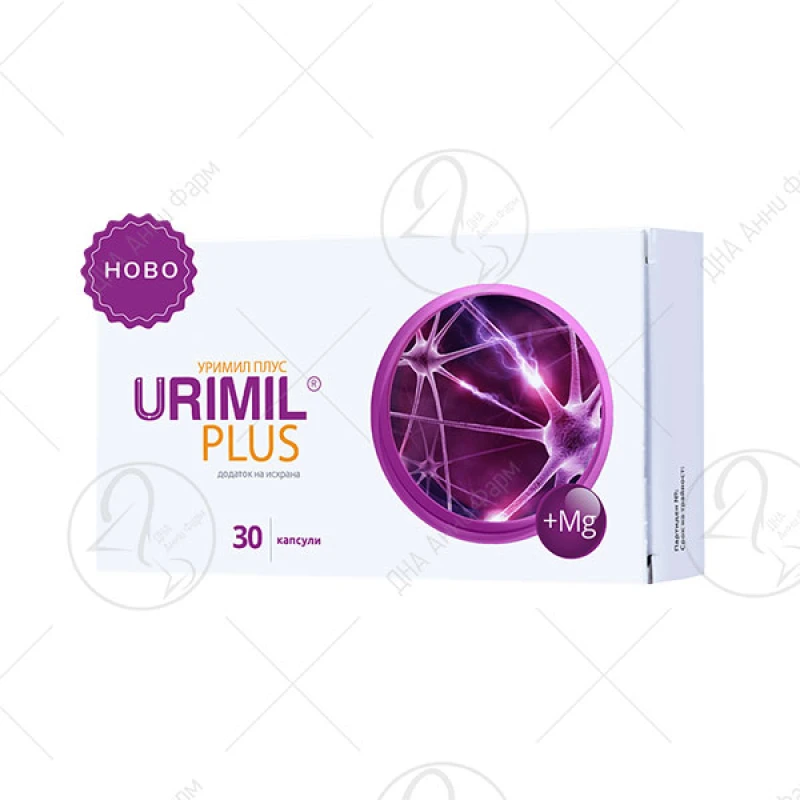-
-
€


Urimil Plus / Urimil Plus is a dietary supplement that supports the normal function of the peripheral nervous system. Urimil Plus / Urimil Plus is a dietary supplement that supports the normal function of the peripheral nervous system. Created to take care of the waist and back, each Urimil Plus capsule contains an optimal combination of 7 nutrients that help regenerate damaged neurons. Useful information: Pain in the waist, back or limbs can be due to: – injuries (fall, impact, dislocation, etc.) – surgical operations – inflammatory or infectious diseases (flu, viral infections, etc.) – other diseases (degenerative changes, narrowing of the spinal canal, spondylolisthesis, osteoporosis, blockages, projection pain in diseases of internal organs, oncological diseases, diabetes, nutritional deficiencies, toxic agents and drugs) One of the most common diseases of the peripheral nervous system are: – sciatica – lumbago – discopathy – cervical radiculitis – intercostal neuralgia – plexitis The peripheral nervous system (PNS) is an extension of the central nervous system (CNS), which consists of the brain and spinal cord. The main function of the peripheral nervous system is to connect the CNS to the limbs and organs of the body. Unlike the CNS, the PNS is not protected by bony tissue (skull and spine) as is the case with the brain and spinal cord and is susceptible to damage. Nerve cells are the smallest structural units of the nervous system. Their number is about 100 billion, with each neuron connected to at least 10,000 others. Neurons in the nervous system vary in shape and size, but their structure is similar. A neuron consists of a body and extensions. One of the extensions, called the axon, is longer than the others and is covered on the outside with a special myelin sheath, which plays the role of an insulator during the transmission of the nerve impulse. Through the axon, the cell sends information to other cells. Regeneration of peripheral nerves In order for the body to activate its own mechanisms for recovery (regeneration), certain nutrients are needed. Urimil Plus/Urimil Plus provides the body with the right combination of 7 important nutrients, which help to rebuild the myelin sheath, and from there to regenerate damaged neurons: Uridine monophosphate: – participates in the synthesis of nucleic acids; - participates in the construction of cell membranes; – builds dendrites, which support synaptic function; – stimulates the formation of myelin (axon insulator) – supports and accelerates neuromuscular regeneration and stops pain. Uridine is present in many nutritional products, but in that form it is not bioavailable due to the fact that it is almost completely degraded in the liver and in the gastrointestinal tract. Folic acid: – Folic acid, also called vitamin B9, is one of the most important vitamins for health: – participates in the creation of a large number of enzymes; - participates in the synthesis of DNA and RNA; – participates in the synthesis of important amino acids; – affects the activity of genes in nerve cells and helps in the regulation of genes involved in regeneration; – helps in the regeneration of the axon and its return to function after injuries. Vitamin B12 Vitamin B12, or cobalamin, is needed for the production of myelin. Numbness, tingling and loss of sensation in the extremities are some of the symptoms of peripheral neuropathy due to vitamin B12 deficiency. Statistical data show that between 5% and 20% of the adult population have a deficiency of vitamin B12, and up to 40% have a low level of vitamin B12 in the plasma. Vitamin B6 Vitamin B6 is important for the metabolism of amino acids, glucose and fats. In adults, vitamin B6 deficiency neuropathy begins with numbness or severe pain in the feet, which then spreads upward to affect the legs and arms. Although Vitamin B6 is present in many nutritious products, during the cooking process of the food, up to 70% of the vitamin is lost. On the other hand, humans are unable to synthesize vitamin B6, so intake from external sources is necessary. Vitamin B1 Thiamine (Vitamin B1) is a water-soluble vitamin and is present in most plant and animal tissues. It is important for cellular respiration, for the production of neurotransmitters (glutamate and γ-aminobutyric acid) and for maintaining the myelin sheath. Thiamin deficiency leads to a neuropathy known as beriberi and is the first described vitamin deficiency syndrome in humans. As a result of a lack of Vitamin B1 in the diet, within a few days to a few weeks, fatigue, irritability and muscle spasms may appear. The clinical picture of Vitamin B1 deficiency begins with loss of sensitivity, severe pain, weakness in the muscles of the legs and feet. Vitamin B3 Vitamin B3, also known as niacin or nicotinic acid, is important for the metabolism of carbohydrates, fats and proteins, as well as for intercellular signal transduction and DNA repair in the cell. A lack of niacin in the diet can cause nausea, skin and oral lesions, anemia, headaches and fatigue. Magnesium (Mg): Magnesium is an important trace element that participates in over 300 different enzyme systems and thus regulates various processes in the human body, one of which is neuromuscular conduction. Research shows that the average intake of magnesium in the diet is relatively low, reaching only 30 to 50% of the recommended daily intake, which is 420 mg for men and 320 mg for women per day. A clinical study conducted on patients with chronic low back pain shows a significant reduction in pain and improved mobility in patients receiving Magnesium.
No Review Found.
Login To Comment